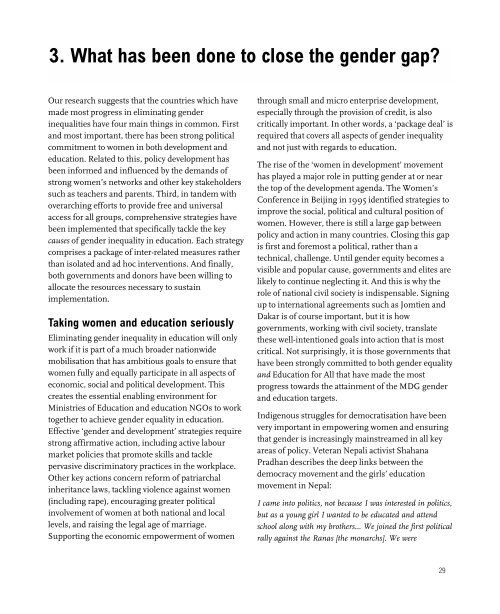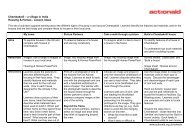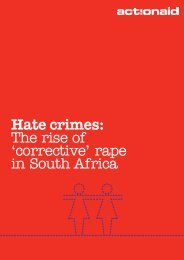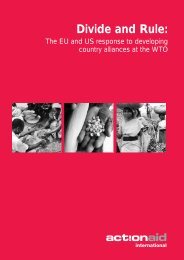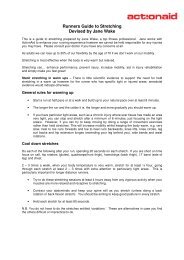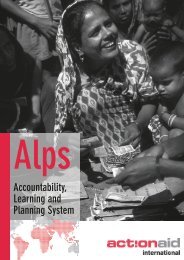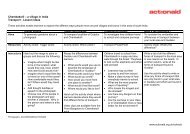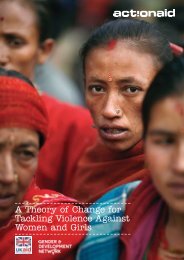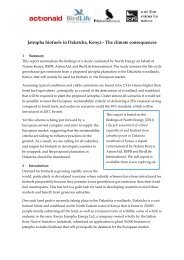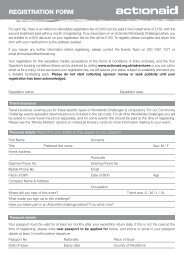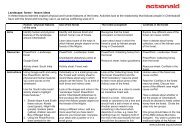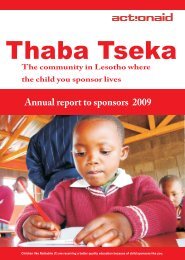A fair chance - United Nations Girls' Education Initiative
A fair chance - United Nations Girls' Education Initiative
A fair chance - United Nations Girls' Education Initiative
Create successful ePaper yourself
Turn your PDF publications into a flip-book with our unique Google optimized e-Paper software.
3. What has been done to close the gender gap?Our research suggests that the countries which havemade most progress in eliminating genderinequalities have four main things in common. Firstand most important, there has been strong politicalcommitment to women in both development andeducation. Related to this, policy development hasbeen informed and influenced by the demands ofstrong women’s networks and other key stakeholderssuch as teachers and parents. Third, in tandem withoverarching efforts to provide free and universalaccess for all groups, comprehensive strategies havebeen implemented that specifically tackle the keycauses of gender inequality in education. Each strategycomprises a package of inter-related measures ratherthan isolated and ad hoc interventions. And finally,both governments and donors have been willing toallocate the resources necessary to sustainimplementation.Taking women and education seriouslyEliminating gender inequality in education will onlywork if it is part of a much broader nationwidemobilisation that has ambitious goals to ensure thatwomen fully and equally participate in all aspects ofeconomic, social and political development. Thiscreates the essential enabling environment forMinistries of <strong>Education</strong> and education NGOs to worktogether to achieve gender equality in education.Effective ‘gender and development’ strategies requirestrong affirmative action, including active labourmarket policies that promote skills and tacklepervasive discriminatory practices in the workplace.Other key actions concern reform of patriarchalinheritance laws, tackling violence against women(including rape), encouraging greater politicalinvolvement of women at both national and locallevels, and raising the legal age of marriage.Supporting the economic empowerment of womenthrough small and micro enterprise development,especially through the provision of credit, is alsocritically important. In other words, a ‘package deal’ isrequired that covers all aspects of gender inequalityand not just with regards to education.The rise of the ‘women in development’ movementhas played a major role in putting gender at or nearthe top of the development agenda. The Women’sConference in Beijing in 1995 identified strategies toimprove the social, political and cultural position ofwomen. However, there is still a large gap betweenpolicy and action in many countries. Closing this gapis first and foremost a political, rather than atechnical, challenge. Until gender equity becomes avisible and popular cause, governments and elites arelikely to continue neglecting it. And this is why therole of national civil society is indispensable. Signingup to international agreements such as Jomtien andDakar is of course important, but it is howgovernments, working with civil society, translatethese well-intentioned goals into action that is mostcritical. Not surprisingly, it is those governments thathave been strongly committed to both gender equalityand <strong>Education</strong> for All that have made the mostprogress towards the attainment of the MDG genderand education targets.Indigenous struggles for democratisation have beenvery important in empowering women and ensuringthat gender is increasingly mainstreamed in all keyareas of policy. Veteran Nepali activist ShahanaPradhan describes the deep links between thedemocracy movement and the girls’ educationmovement in Nepal:I came into politics, not because I was interested in politics,but as a young girl I wanted to be educated and attendschool along with my brothers... We joined the first politicalrally against the Ranas [the monarchs]. We were29


